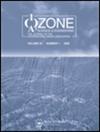采用Ti/Ti0.7Ru0.3O2阳极型液流电池系统对某制革废水进行电化学处理
IF 1.4
4区 环境科学与生态学
Q3 ENGINEERING, ENVIRONMENTAL
引用次数: 0
摘要
采用Ti/Ti0.7Ru0.3O2阳极(尺寸稳定阳极(DSA)型电极)下流条件,对摩洛哥非斯市“Dar Dbagh”制革厂(DDT)生产的实际废水进行了电化学氧化。详细研究了氯离子浓度、电解时间、电流密度、初始pH和温度等不同操作参数对电解效果的影响。将脱色率和化学需氧量(COD)去除率作为监测DDT废水电化学处理过程的关键实验指标。结果表明,在室温条件下,以0.033 M Na2SO4 + 0.800 M NaCl为支撑电解质,在电流密度为20 mA cm−2的酸性条件下,脱色率和COD去除率分别为100%和56%。使用Ti/Ti0.7Ru0.3O2阳极,出水COD的最大降幅为39.24 kWh / m3,这清楚地表明DSA电极可能是DDT废水修复的良好替代方案。本文章由计算机程序翻译,如有差异,请以英文原文为准。
Using Ti/Ti0.7Ru0.3O2 anode-type with a Flow Cell System for the Electrochemical Treatment of a Tannery Wastewater
ABSTRACT The electrochemical oxidation of a real wastewater discharged by the baths of “Dar Dbagh” tannery (DDT) in Fez city (Morocco) was performed using Ti/Ti0.7Ru0.3O2 anode (a dimensionally stable anode (DSA)-type electrode) underflow condition. The effect of different operational parameters, namely chloride ions concentration, electrolysis time, current density, initial pH, and temperature has been studied in detail. The discoloration and chemical oxygen demand (COD) removal have been taken as the key experimental indicators to monitor the electrochemical treatment process of DDT wastewater. The obtained results have shown that the best degradation rates (i.e., 100% and 56% of de-colorization and COD removal, respectively) were accomplished under acidic conditions at 20 mA cm−2 as a current density in the presence of 0.033 M Na2SO4 + 0.800 M NaCl as supporting electrolyte at room temperature. The maximum reduction of the effluent COD attained using Ti/Ti0.7Ru0.3O2 anode consuming 39.24 kWh per m3 clearly shows that DSA electrodes could be a good alternative for the remediation of DDT effluents.
求助全文
通过发布文献求助,成功后即可免费获取论文全文。
去求助
来源期刊

Ozone: Science & Engineering
环境科学-工程:环境
CiteScore
5.90
自引率
11.10%
发文量
40
审稿时长
2 months
期刊介绍:
The only journal in the world that focuses on the technologies of ozone and related oxidation technologies, Ozone: Science and Engineering brings you quality original research, review papers, research notes, and case histories in each issue. Get the most up-to date results of basic, applied, and engineered research including:
-Ozone generation and contacting-
Treatment of drinking water-
Analysis of ozone in gases and liquids-
Treatment of wastewater and hazardous waste-
Advanced oxidation processes-
Treatment of emerging contaminants-
Agri-Food applications-
Process control of ozone systems-
New applications for ozone (e.g. laundry applications, semiconductor applications)-
Chemical synthesis.
All submitted manuscripts are subject to initial appraisal by the Editor, and, if found suitable for further consideration, to peer review by independent, anonymous expert referees.
 求助内容:
求助内容: 应助结果提醒方式:
应助结果提醒方式:


